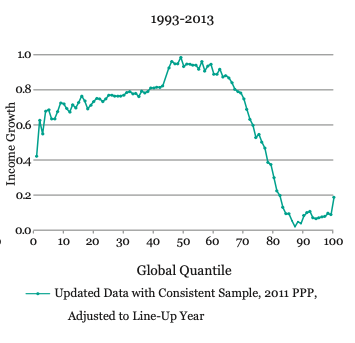
This is a possible scenario by ~2040: Centralized China vs International India. Surveillance state vs decentralized digital diaspora. Two rising powers, with very different cultures.
The US may be like the declining British Empire, whose dominance in 1913 was gone by 1945.
The US may be like the declining British Empire, whose dominance in 1913 was gone by 1945.
https://twitter.com/buirachel/status/1460508564359823374
The naive version of this thesis is the idea that India will ever match, let alone out-execute China in physical infrastructure.
The sophisticated version is that it’s all going digital, decentralized, diasporic — and in that plane India is more naturally suited than China.
The sophisticated version is that it’s all going digital, decentralized, diasporic — and in that plane India is more naturally suited than China.
https://twitter.com/balajis/status/1446421190793318404
The conventional wisdom is that we are gearing up for a multi-decade conflict between the US and China.
But what if the US gets KO’d in the first round, by military defeat abroad and inflation at home, followed by civil conflict and/or a national divorce?
But what if the US gets KO’d in the first round, by military defeat abroad and inflation at home, followed by civil conflict and/or a national divorce?
https://twitter.com/balajis/status/1450939277093662723
There’s another 1st round KO possibility, which I mention for the sake of completeness. Garside’s book “China Coup” makes the case that Xi could be felled by his internal enemies (possible!) and that this will lead to democratization (IMO implausible). washingtonpost.com/outlook/unreal…
The naive anti-China take is the idea that their navy is or will remain weak, that they’re an economic house of cards, that they’ll fall in a ditch. Cope, IMO.
The smarter version is that there are pressure points around leadership itself. That’s also the Longer Telegram thesis.
The smarter version is that there are pressure points around leadership itself. That’s also the Longer Telegram thesis.
https://twitter.com/balajis/status/1450998871245557761
As a sci-fi scenario, let’s assume the 1st round US KO happens. The US loses to CCP on Taiwan, then sees a global run on the dollar, along with domestic unrest.
After all, fiat currency is backed by men with guns, so the dollar’s strength is tied to perceived military might.
After all, fiat currency is backed by men with guns, so the dollar’s strength is tied to perceived military might.
https://twitter.com/balajis/status/1446500913787518976
After the dust settles, the century may then shape up.
The 1st Cold War between the US & Russia was tank against tank, plane against plane. Symmetric.
This 2nd Cold War between China and Indians + world (not India per se) may be centralization vs decentralization. Asymmetric.
The 1st Cold War between the US & Russia was tank against tank, plane against plane. Symmetric.
This 2nd Cold War between China and Indians + world (not India per se) may be centralization vs decentralization. Asymmetric.
The global conflict of capitalism vs communism, US vs USSR, was political and geographic. Who controls what territory?
The global conflict of centralization vs decentralization, China + tributaries vs Indians + allies, may be digital and economic. Who runs what networks?
The global conflict of centralization vs decentralization, China + tributaries vs Indians + allies, may be digital and economic. Who runs what networks?
People aren’t really gaming out how to protect liberal values in a world where the US military loses to CCP & the dollar fails. It’s just assumed this will never happen.
But the strength of the Chinese superstate in that scenario will be immense. Many would bend the knee.
But the strength of the Chinese superstate in that scenario will be immense. Many would bend the knee.
Btw, on a 20 year timeframe, robotics may erode China’s manufacturing advantage, and drones may do the same to China’s military advantage — turning both into software.
Their ban on decentralized backends may even put them behind from a cybersecurity standpoint, in the long-term.
Their ban on decentralized backends may even put them behind from a cybersecurity standpoint, in the long-term.
https://twitter.com/balajis/status/1435670019543744517
• • •
Missing some Tweet in this thread? You can try to
force a refresh











